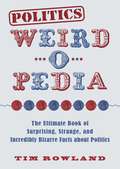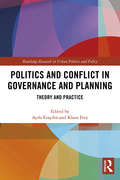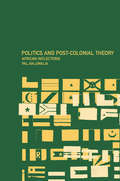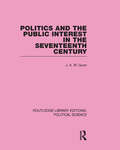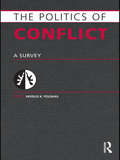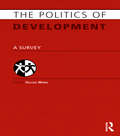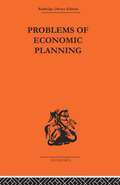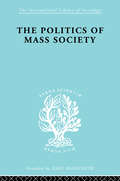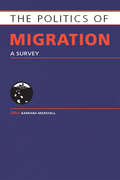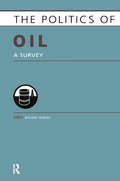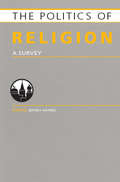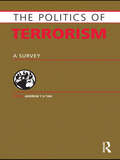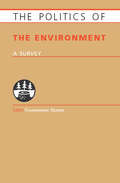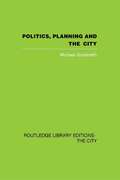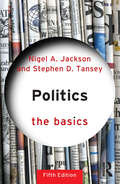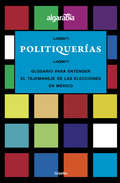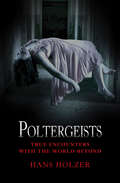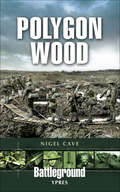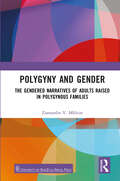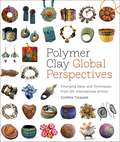- Table View
- List View
Politics Review Magazine Volume 29, 2019/20 Issue 2
by Philip Allan MagazinesContents: Ten years of the UK Supreme Court Maria EganIdeas and thinkers: Ayn Rand and American conservatism Steve DaviesWhy do US political parties still matter? Simon LemieuxExam eye: How polarised are US political parties? Chris WilkinsonGlobal governance and the environment Josie GadsbyThe UK Supreme Court: key cases David TuckExam success: How to write an A* essay in AQA exams Emma KilheeneyThe media and voting behaviour Rowena HammalDebate: Is nationalism defined by race? Moyra Grant and Paul FloydCase study: The role and power of the Scottish Parliament Clare StansfieldComparing UK and US pressure groups Mike DawkinsExam eye: Comparing UK and US pressure groups Katie ShapiroExam success: Edexcel study guide Paul FloydFocus on... Multiculturalism Richard Kelly
Politics Weird-o-Pedia: The Ultimate Book of Surprising, Strange, and Incredibly Bizarre Facts about Politics
by Rowland TimGovernment and politics might seem twisted today, but they’ve always been strange.There’s something about public office that, throughout time, has transcended normalcy. Politics Weird-o-Pedia presents some of the oddest and most interesting political absurdities and tidbits from around the world, from Peter the Great’s tax on beards to a lawmaker’s mistress whom he kept on the congressional payroll despite her admission that “I can't type, I can't file, I can't even answer the phone.” Eminences include: Some of America’s Founding Fathers wanted to jail newspaper reporters. A Mongolian conqueror liked to build cement walls out of the bodies of his vanquished opponents (while they were still alive). An all-female resistance to nuclear missiles in Britain resulted in a protest that lasted for nineteen years—long after the missiles were gone. Politics Weird-o-Pedia doesn’t stand still for a minute. It is intriguing, funny, and occasionally startling. It is more than a collection of trivia, adding bits of context and historical vignettes that make it clear that no matter how dysfunctional politics and government might seem today—we’ve been through it all many times before.
Politics and Conflict in Governance and Planning: Theory and Practice (Routledge Research in Urban Politics and Policy)
by Ayda Eraydin Klaus FreyPolitics and Conflict in Governance and Planning offers a critical evaluation of manifold ways in which the political dimension is reflected in contemporary planning and governance. While the theoretical debates on post-politics and the wider frame of post-foundational political theory provide substantive explanations for the crisis in planning and governance, still there is a need for a better understanding of how the political is manifested in the planning contents, shaped by institutional arrangements and played out in the planning processes. This book undertakes a reassessment of the changing role of the political in contemporary planning and governance. Employing a wide range of empirical research conducted in several regions of the world, it draws a more complex and heterogeneous picture of the context-specific depoliticisation and repoliticisation processes taking place in local and regional planning and governance. It shows not only the domination of market forces and the consequent suppression of the political but also how political conflicts and struggles are defined, tackled and transformed in view of the multifaceted rules and constraints recently imposed to local and regional planning. Switching the focus to how strategies and forms of depoliticised governance can be repoliticised through renewed planning mechanisms and socio-political mobilisation, Politics and Conflict in Governance and Planning is a critical and much needed contribution to the planning literature and its incorporation of the post-politics and post-democracy debate.
Politics and Post-Colonial Theory: African Inflections
by Pal AhluwaliaThis groundbreaking book makes sense of the complexities and dynamics of post-colonial politics, illustrating how post-colonial theory has marginalised a huge part of its constituency, namely Africa.Politics and Post-Colonial Theory traces how African identity has been constituted and reconstituted by examining issues such as:* negritude* the rise of nationalism* decolonisation.The book also questions how helpful post-colonial analysis can be in understanding the complexities which define institutions including:* the nation-state* civil society* human rights* citizenship.Politics and Post-colonial Theory bravely breaks down disciplinary boundaries. Its radical vision will be essential reading for all those engaged in Politics, post-colonial studies and African studies.
Politics and the Public Interest in the Seventeenth Century (Routledge Library Editions)
by J. A. GunnThis book examines the concept of public interest against the background of English politics from the Civil War to the coming of the Hanoverians. These years witnessed both the rise of the modern notion of the public interest as a part of ordinary political language and the growth of a social philosophy of individualism. The new ideas challenged the status quo, based on order, reason of state and national power, in the name of legitimate self-interest and respect for the rights of the private person. In presenting a complex set of ideas in their historical context, the author examines both abstract philosophies and the issues of the day as recorded in press, pulpit and law courts. A chapter devoted to economic thought includes a re-assessment of the social assumptions of mercantilism.
Politics of Conflict: A Survey
by Vassilis K. FouskasFour sections present a thorough overview of current issues in the politics of conflict in historical perspective. Essay chapters written by a variety of academic and other experts on topics including conflicts in Latin America, Africa, the Caucasus and Central Asia, South Asia and South-East Asia, the Arab-Israeli Conflict and Yugoslavia provide background analysis and information on some of the key aspects of conflicts in the world. It also includes an A – Z glossary of conflicts in the world, Maps of countries and regions and a select bibliography.
Politics of Development: A Survey
by Heloise WeberThe Politics of Development: A Survey provides an overview of the intrinsically political relations of development. It brings together essays written by experts in the politics of development and covers a range of significant and topical concerns: gender, race, indigenous development, social movements, religion, security, environmental concerns, colonialism and its legacies, migration, the political economy of development, trajectories in urbanization, and the agrarian question. It introduces and examines key concepts and approaches which have underpinned development, as well as the struggles it has engendered historically, and in contemporary contexts. This volume provides critical insights into the global politics of development and offers alternative analytical frameworks for understanding the relationships around development and inequalities. The Politics of Development: A Survey is organized in an accessible manner, catering to a wide audience (ranging from undergraduates at University level to practitioners and Non-Governmental Organizations [NGOs] engaged in advocacy as well as practical political aspects), and provides introductions to key issues and themes around contemporary challenges and opportunities in development. The title also includes an A-Z Glossary, covering key terms, organizations, concepts and actors in the politics of development.
Politics of Economic Planning: Papers on Planning and Economics
by E.F.M. DurbinThe issue of planning prompted some of the fiercest debate in mid-twentieth century economics. Politics of Economic Planning collects together a number of papers from journals and contributed books that examine the problems of economic planning in a free society. They fall into three groups:Part 1 explains the idea of socialism and defines it in relation to democracy.Part 2 discusses problems of economic planning both in relation to political economy on the practice of planning and with the application of the theory of value to the conditions of a centrally directed economy.Part 3 examines the nature of economics.
Politics of Mass Society (International Library of Sociology)
by William Kornhauser"The Politics of Mass Society" explores the social conditions necessary for democracy and the vulnerabilities of large scale society to totalitarian systems. Mass movements mobilize people who are alienated from the social system, who do not believe in the legitimacy of the established order, and who are therefore ready to engage in efforts to destroy. Contrary to the psychological approach prevalent in European doctrines of mass movements, Kornhauser persuasively argues that social order is the critical factor. The greatest number of people available to mass movements are located in those segments of society that have the fewest ties to social order.The book draws on a wide range of materials - from classical political theory contemporary sociological analysis, historical and intuitional studies, public opinion surveys, and other published and unpublished data. Kornhauser selected political phenomena in organizations, communities, classes, and whole societies. He examined support for communism and fascism in a variety of countries in relation to rates of urbanization and, industrialization, employment, suicide and homicide, among other phenomena. In his new introduction, Irving Louis Horowitz identifies Kornhauser's book as a seminal work of the great tradition in political sociology at mid-twentieth century.Kornhauser points out that modern democratic systems possess a distinct vulnerability to mass movements. He spells out and identifies factors that tend to increase or decrease this vulnerability - not least the health and strength of elites. In this way, the book reveals new clues to the origins and nature of mass political movements. "The Politics of Mass Society" remains the most complete analytical account of the sociological approach to mass society in advanced industrial societies.
Politics of Migration: A Survey
by Barbara MarshallThis new collection includes essays covering specific themes in the field of migration and geographic overviews, written by a variety of academics and experts. It also contains key maps and a glossary covering up-to-date issues in the field of migration, including theories, issues, countries, national and international organizations and personalities.
Politics of Oil: A Survey
by Bülent GökayThis new title presents key information on the oil industry world-wide, and will be of interest to anyone involved in or studying the politics of oil production, processing and selling. Oil has long been at the forefront of political agendas, and with increased tensions in the Middle East, there has never been a greater need for up-to-date, reliable information on this key industry. Includes: * essays covering the main themes * an A-Z glossary listing important terms * detailed maps * a statistics section.
Politics of Religion: A Survey
This title explores some of the key issues which surround the politics of religion, an area which has historically been the cause of great controversy. Today religion is still the cause of a great deal of political debate, be it the teaching of the creationist theory in the United States or the relationship of church and state in Arabic countries. Four sections present a thorough overview of the politics of religion in historical perspective: Essay chapters written by a variety of academic and other experts on the major world religions and their relationship with politics, and on topics including religious fundamentalism, church and state and religious terrorism, providing background analysis of the links between religion and politics. A – Z glossary of religions, religious groups, ideas and issues, including entries on Agnosticism, Bradford Council of Mosques, Muslim Brotherhood, Nirvana, the World Council of Churches, etc. Entries are up-to-date and cross referenced for ease of use, and symbols at the end of each entry denote to which major religion(s) the entry refers. Maps for reference, showing adherents to major religions worldwide, adherents to religions in the Middle East, and adherents to the major sub-types of Christianity. This title offers up-to-date and unbiased information that will provide a wealth of information to students, academics, business people and general researchers.
Politics of Terrorism: A Survey
by Andrew T H TanTerrorism is increasingly at the forefront of political agendas. Events world-wide have led to an increased awareness and response to this global phenomenon. The focus of this volume is on examining the fundamental causes of alienation and rebellion that underlie the use of terrorism as an instrument of violence. This title includes: essays, each of around 8,000 words in length, providing in-depth analysis of topics of relevance in the subject an A-Z glossary of key terrorist groups and organizations, as well as major terrorist incidences and events detailed maps and statistics an extensive bibliography listing further relevant reading material. This unique combination of analytically detailed essays with statistics and a glossary make this title a unique one-stop reference source as well as a training and education guide on the politics of terrorism world-wide.
Politics of the Environment: A Survey
by Chukwumerije OkerekeThe environment is increasingly seen at the forefront of many political agendas. Covering important topics, such as the Kyoto protocol and deforestation, this book provides extensive coverage of all aspects of environmental politics. Essays of around 6,000 words in length make up the bulk of the book. Written by notable experts in the field of environmental politics, these essays each examine a different aspect of the subject.
Politics, Planning and the City
by Michael GoldsmithPolitics, Planning and the City is designed to introduce the complex political processes and problems of the modern city. The author begins by setting the theoretical context and discusses models of democracy, power and the nature of policy. Next he examines change and the city, by focusing on actual decision-making. Three major policy areas affecting the city - housing, planning and the social services - are then reviewed and the post-war experiences analysed. The author concludes by discussing the consequences, intended and unintended, for the city adn asks whether city governments can cope with the future. This book was first published in 1980.
Politics: The Basics. Basics (The Basics)
by Nigel Jackson Stephen D TanseyNow in its fifth edition, Politics: The Basics explores the systems, movements and issues at the cutting edge of modern politics. A highly successful introduction to the world of politics, it offers clear and concise coverage of a range of issues and addresses fundamental questions such as: • Why does politics matter? • Why obey the state? • What are the key approaches to power? • How are political decisions made? • What are the current issues affecting governments worldwide? Accessible in style and topical in content, the fifth edition has been fully restructured to reflect core issues, systems and movements that are at the centre of modern politics and international relations. Assuming no prior knowledge in politics, it is ideal reading for anyone approaching the study of politics for the first time.
Politiquerías: Glosario para entender el tejemaneje de las elecciones en México
by AlgarabíaPásele, sin temor ni aficiones encarnadas, a dar un recorrido al estrambótico y singular mundo del voto y el votado. Cada sexenio durante época de elecciones, o incluso cada día, nos encontramos con que los políticos de nuestro país nos ofrecen una gran cantidad de términos que a veces no entendemos y en otras ocasiones permanecen grabados en lo más profundo de la memoria. Las páginas venideras están llenas de triquiñuelas y felonías, en las que encontrará divertimentos y acepciones -cada una con su ejemplo de la vida real- de actos frecuentes en nuestro complejo sistema democrático. También disfrutará de datos curiosos sobre nuestros expresidentes, mandamientos para el «buen político», citas literarias, de personajes famosos y del pueblo; en fin, un amplio panorama de colores y tonos para entender -si esto es posible- un poco más del toma y daca, el tejemaneje y el estira y afloje de las elecciones en nuestra gran nación. Pásele, sin temor ni aficiones encarnadas, a dar un recorrido al estrambótico y singular mundo del voto y el votado.
Polity and Constitution Part-1 - IAS Competitive Exam
by Vision IasUpdated Value Additional Material for 2020 IAS examination on topic Polity and Constitution Part 1.
Polity and Constitution Part-2 - IAS Competitive Exam
by Vision IasUpdated Value Additional Material for 2020 IAS examination on the topic Polity and Constitution - Part 2.
Polity and Constitution Part-3 - IAS Competitive Exam
by Vision IasUpdated Value Additional Material for 2020 IAS examination on the topic Polity and Constitution - Part 3.
Polity and Constitution Part-4 - IAS Competitive Exam
by Vision IasUpdated Value Additional Material for 2020 IAS examination on the topic Polity and Constitution - Part 4
Poltergeists: True Encounters With The World Beyond (True Encounters with the World Beyond #8)
by Hans HolzerParanormal expert Hanz Holzer investigates some of the most famous poltergeists in history Poltergeist is a German term that translates simply to “noisy ghost.” One of the main characteristics of a poltergeist is its high level of activity; it often manifests itself by moving or even throwing objects. Professor Hans Holzer reexamines these most menacing of hauntings, including the famous case of the Bell Witch of Tennessee, a nineteenth-century spirit, and the Millbrae Poltergeist, which crashes around a suburban home.
Polygon Wood (Battleground Ypres)
by Nigel CaveThis wood featured significantly in the First and Third Battles of Ypres and was the scene of numerous deeds of heroism, such as that which won young Lieutenant-Colonel Philip Bent the VC. The courage of individuals and units from Britain and Australia is described in this latest edition to the series covering Ypres.
Polygyny and Gender: The Gendered Narratives of Adults Raised in Polygynous Families
by Zamambo V. MkhizeThe people of Africa have contrasting perspectives on gender, feminism, and the family from their Western counterparts. Similarly, social structures like, religion, capitalism and the law require a context-specific application to polygyny. This book examines the construction of gender identity in adults raised in Zulu polygynous families in the Hammarsdale area in KwaZulu-Natal, South Africa. It highlights the complexities of gender identities as participants negotiate between modern, constitutional, and individual freedoms and patriarchal, cultural, and communal customs and traditions. The themes also point towards the argument between individuality and collectivism in the creation of gender identity within polygynous families in Zulu culture. The South African Constitution guarantees gender equality and individual rights and freedoms for its citizens, yet customary law practices, like polygyny, appear to contravene these principles. The participants reveal that although women and men experience different consequences, they cite similar prevalent factors like gender role socialisation, naming practices and the doctrine of seniority, influencing their gender identity construction. Print edition not for sale in Sub Saharan Africa.
Polymer Clay Global Perspectives: Emerging Ideas and Techniques from 125 International Artists
by Cynthia TinappleExplore the World--in Polymer Clay!Polymer artists are connected like never before. As the acclaimed curator of the popular blog PolymerClayDaily.com, Cynthia Tinapple brings together 115 diverse artists from around the world to showcase the work of this new international community. Polymer Clay Global Perspectives invites you to explore the trends and cutting-edge styles that are influencing the future of this medium. In this masterful collection, you'll find: · Tips to create meaningful art that reflects your personality and vision· Behind-the-scenes profiles of 13 innovative artists in their studios· Step-by-step projects by contributors who share their signature methods, such as mokume gane,extruded canes, and adapted glass-blowing techniques· Galleries showcasing the best of the best polymer work in jewelry, miniatures, sculpture, and much moreWith artists including Kim Korringa, Shay Aaron, and Fabiola Perez offering their expertise, you'll find endless inspiration to take your art to the next level. Begin your own journey through the new landscape of contemporary polymer. A world of possibilities awaits.

